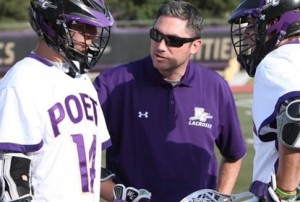Bill Tully doesn’t have quite the resume that Michigan Offensive Coordinator hire Judd Lattimore does, but let’s take a look at what he’s done in his previous stops. This should be easy, as he’s held one paid college coaching position, as the offensive coordinator for D-3 Whittier College during the least two seasons.
Offense
The team on the whole wasn’t so successful, finishing 69th out of 179 D-3 teams to LaxPower’s computers. The prior year – despite a better record – the Poets were 70th of 166 teams. The year before Tully arrived at Whittier, they were 46th out of 156 teams. The upshot of all that? The strength of schedule was by far the easiest in 2010, Tully’s first year with the squad. That means these numbers should be taken with a bit of context:
| Year | Record | Possessions | Goals | Efficiency |
|---|---|---|---|---|
| 2009 | 6-6 | 357 | 127 | .356 |
| 2010 | 9-6 | 562 | 174 | .310 |
| 2011 | 4-7 | 334 | 64 | .192 |
So, that doesn’t look particularly flattering. Immediately upon his arrival, the team’s offensive efficiency went downhill – even though the strength of schedule got easier. Last year, the bottom fell out on Whittier’s offense, with a putrid efficiency number as the opposition got much tougher (if the NCAA’s statistics website was a little more functional, I’d check out opposing defensive efficiency numbers, but them’s the ropes).
Unfortunately, there wasn’t a ton of roster turnover to explain the struggles. Four of 2009’s six leading scorers (the only guys on the team with double-digit goals or even double-digit points) returned for the 2010 season, and with an easier strength of schedule, you’d expect improvement on offense. Instead, the pace got a ton quicker, but the efficiency dropped. This could be due to a change in offensive/team philosophy, but with no change at the head coach position, a lot of the blame falls to Tully.
Going into 2011, the tougher schedule bears some of the blame for a much worse offense, but again, there was little roster turnover. Five of the top six scorers returned, including the top four, and the offense struggled to get much of anything done, scoring on fewer than 20% of offensive possessions.
Before his stint at Whittier, Tully spent one season as a volunteer coach at Drexel, running the squad’s scout team offense (to prepare the Drexel D for opponents). Statistically, it’s tough to quantify what effect the scout team offense has on the team. I guess, if the scout team is run well, it would mean a better defense, no? TO THE CHART:
| Year | Record | DPossessions | Goals Allowed | DEfficiency |
|---|---|---|---|---|
| 2008 | 13-4 | 542 | 123 | .227 |
| 2009 | 7-8 | 502 | 128 | .255 |
| 2010 | 10-5 | 467 | 125 | .268 |
So, the defensive efficiency got slightly worse (low is good on defense) in Tully’s lone season running the scout team offense, but that trend continued when he left, so it’s unfair to draw any conclusions about it. The overall record isn’t great, but a volunteer assistant coach can only bear so much responsibility – almost none – for overall team performance. The biggest issue with Drexel’s team in 2009 was non-dominance in the possession game. They were uncharacteristically average (.503) on faceoffs, and it was their worst year clearing in our dataset.
Other
So, if Bill Tully isn’t a proven offensive mind, he must bring something else to the table. Obviously, personality fit with the current staff and team are important, as long as shared vision and goals for the program going forward. He also has responsibilities aside from running the O, and his recruiting might be the most important.
He’s been a high school coach in the past, as well as an All-Star club team coach and Midwest Camp Director, all in the Chicago area. He also has East Coast connections from his college career and his coaching stint at Drexel, along with Los Angeles-area connections thanks to his gig the past two years.
If Detroit wants to expand its recruiting reach (they currently focus on Michigan and Ontario, with forays into Ohio and Long Island), Tully is the sort of guy who can help them break into a couple areas with growing lacrosse scenes. He’s also a young coach, generally considered a positive in recruiting.
The Verdict
The jury is out on this hire. Detroit – as a young program with little history of success – obviously isn’t going to attract the highest-profile candidates for an assistant coaching job, so an under-the-radar hire is the expectation. On the same note, however, head coach Matt Holtz wasn’t a high-profile hire, and he’s done just fine at UDM.
Tully fits that mold, as a guy who hasn’t shown much on the field yet, but is still very young. Both he and the position will probably grow together a little bit, and there may be some hiccups this season. Even with returning talent in the past, his unit didn’t show improvement, so whether Detroit’s returning talent (pretty much everyone) will ease the transition is in question. However, if he can win some recruiting battles, the product on the field will eventually take care of itself.

